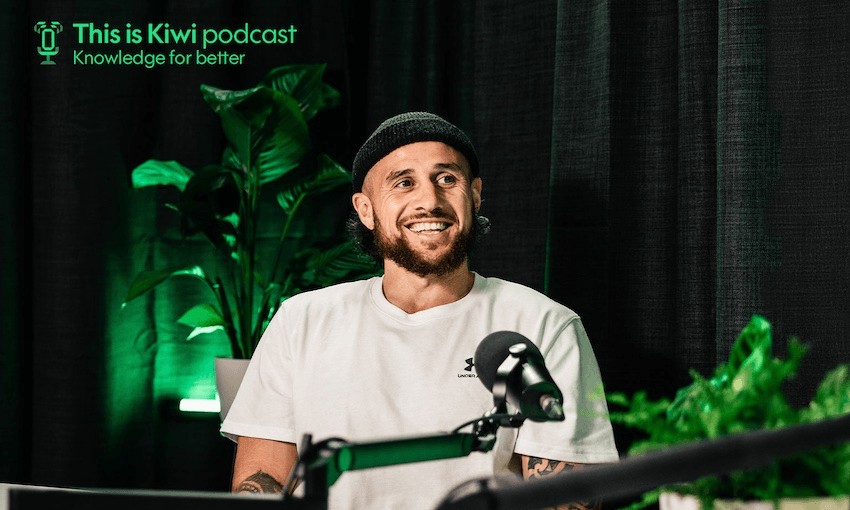TJ Perenara credits his success on the rugby field to one of the biggest sacrifices he’s made – time. The All Blacks and Hurricanes legend joined Kiwibank’s This is Kiwi podcast for a raw and honest chat.
TJ Perenara’s mullet is iconic. But the man is more than his hair. He’s a husband, father, son, world class athlete, rugby player, businessman and more.
In 2023, TJ ruptured his achilles and missed the entire Super Rugby season and the World Cup as a result. After 17 months recovery though, he returned triumphant in a 29-21 win over the Blues. Following that he became Super Rugby’s all-time leading try scorer. He’s the only player in the top ten who is not a midfielder or outside back.
TJ’s success is legendary and he joined Jane Yee on This is Kiwi, a Kiwibank series in collaboration with The Spinoff Podcast Network. Read an excerpt from the full interview below.
Jane: It was hard to get you on this show. You’ve got a lot going on, what’s your schedule like?
TJ: Yeah we do have a very busy schedule, two little kids at home, our boy is five months old. Our girl is three and a half. So things are busy back home, both on and off the field. But it’s nice being able to make some time and come on the show.
Do you find having kids brings out your inner child?
I really enjoy how real my daughter is, how everything is just new to her, and she’s excited about the smallest things in life. It brings a new perspective, probably an old perspective, actually something that I would have had when I was younger. Maybe kids are here to slow us down.
What were you like as a kid?
A sore loser! My parents didn’t try to get that out of me though. It was more about if you don’t like that feeling find a way to not feel it, to win. Everything with my siblings turned into a competition. Who can stay in bed the longest?
What were you like as a teenager?
Very single. Focused. Yeah, I wanted to be an All Black.
So how did you get there?
I disregarded a lot of other things in order to put myself in the best position to be an All Black. My old man used to say “the hardest trainers make the best players”. I clung to that. My best mate, he’s playing rugby in France at the moment, we weren’t the best players, but man, we trained hard, and we both had a vision. We started to go to the gym really early in the morning. We started to see that the work we were putting in before school and stuff was starting to benefit us on the field. I got addicted to that feeling of knowing that I was putting this work in, that other people weren’t. And I was seeing the results out on the field. It was like a light bulb moment where I realised, if I do this forever, it might not mean that I’m going to be an All Black, but it’s going to mean that I give myself the best shot.
Did that singular focus cost you anything?
Definitely, yeah. I do think that I didn’t nurture relationships with my sisters or my parents as much because I just wanted to train. I didn’t nurture relationships with my grandparents as much. So it definitely has its price tag. Now that they’re gone, I don’t have the opportunity to go back and do that, but it is part of that addiction of wanting to be better as you sacrifice something.
What’s a typical day for you?
Let’s do Tuesday. I wake up at five. Hopefully my son wakes up then too so I get the morning with him. Then I’ll get to training. I’ll do reformer pilates in the morning, get my body going, and then I’ll do my skill session. Then I’ll get into some hot/colds, get my recovery going. And then team meetings, then we’re into the gym, then onto the field for training. The stuff I do in the morning is extra, my own stuff. I like having that time for myself. I like just having me and myself and my thoughts for a bit there. When the team stuff is done it’s home time, take my son off my wife. Spend that late afternoon/early evening with him, getting him ready for bed, getting him fed, put him in bed. Then I spend time with my daughter, connect with her before she goes to sleep. And then it’s time with my wife. It’s a busy season so our time together is right at the end of the day, we try to spend as much quality time together as possible. And sometimes quality time is actually sitting there next to each other, saying nothing.
What’s your superpower in your relationship with Greer, your wife?
I think my superpower is that I understand how hard her role is in our household. She stays home with our kids. Both of our jobs are tiring, exhausting. But I understand that her tired is different to mine. So when I get home I make sure that I take the kids, because I need my wife to be able to fill her tank so that she can feel that she’s had time for herself, that she can still give to our family. I don’t think that enough people talk about that, especially fathers who work. I don’t think we talk about the fact that being at home with your kids all day is exhausting in a different way than it is to your job. It’s not saying that your job is less tiring. It’s just a different sort of tired. So I think my superpower is understanding that.
How strongly do you feel about representing Māori, both in sport but also in this way of speaking out?
Very strongly. Maybe not so much in sport though, maybe more so on what we’ve spoken about earlier, on how I am as a father. I have a mate, Louis Davis, he’s been on the podcast before. And what he’s doing for the perception of Māori men and fathers is something that I really aspire to be able to have that same sort of impact, because the misconception might be of Māori fathers and Māori men is like, it’s so bad and so misrepresented. A lot of people paint Māori fathers with this one brush but they are loving, nurturing, caring, providing. And that’s just not what a lot of people would think. I think Louis is doing an amazing job in that space, and it’s something that is more important to me than being a Māori in sport.
You recently became Super Rugby’s leading try scorer. How was it when you went over the line for that try you knew would be the one?
It was a weird moment. It wasn’t that cool of a try. It might have been, honestly, one of my worst tries I’ve scored. I wanted to do something cool. And I’d thought about it, because Julian Savea previously held the record, and I wanted my try to be cool and it just wasn’t. But it’s still cool to have held that record.
You missed a whole Super Rugby season and a World Cup [through injury]… what was that like?
It was tough. I had to have the same achilles surgery twice, which wasn’t nice. It ended up keeping me out for 17 months. But I had so much time for my friends and family. I just decided to invest that time with my people, and we did a lot of cool stuff. Heaps of road trips, we spent all this time together. So it sucked not being out on the field, but, man, I’m grateful for the time that I had, for my friends and family.
You have turned your passion into a career, but also have other jobs. How do you make money?
Endorsement deals. Under Armour is a really big sponsor of mine who takes care of me, I get paid to be an athlete with them. Property is something that I’ve been very lucky to get into. A friend of my grandfather, Tommy, runs a real estate agency and took me under his wing when I was about 18. He spoke to my mum and said he’d seen too many rugby players become professional athletes and leave the game with nothing. When I started playing I got more money than I’d ever had before, it would’ve been easy to make a bad decision. Tommy had me buying property very early in my career. I’m very lucky to have him as a mentor, now friend, in my life. I believe in creating a team around you for certain things. I’ve got a team at rugby. And a financial team around me, too.
Tell us about your pool? You lost money?
Basically we were building a pool. The company went into liquidation and we lost $40k. But yeah, I regret talking about that because I think it’s insensitive to today’s current climate. Venting about that on social media when people are struggling to put food on the table, especially the people that are connected to my community and to the people I care about the most, that was insensitive. And I feel for that company too, because what must they be going through, it is a shit situation. But I think it was the wrong setting for me to say that in. It’s difficult, because you don’t want to go out there and brag. I think for me, it’s not about showing or talking heaps about what I’ve got. It’s the steps that I took to get me there. That is more what I want to portray to people. This is the, this is the journey I took. I still have a long way to go on my journey and where I want to get to. People can relate to hard work, people can relate to sacrifices that they might come up against.
What’s a misconception about you?
I think a lot of people think I’m a dick. A lot of people see me play footy. I’m very passionate, I’m very emotional out on the field. I get it. I completely get why people would think that, but a lot of those people have never sat down and had a conversation with me, had never had a drink, or broken bread with me. I think the only reference some people have is me out on the field giving everything I’ve got to the game that I love and trying to win, and I’m so competitive, and I’m a sore loser, and I get all of that, but that’s the only version of me they know.
If you could sum up the experiences that have led to your success in one word what would it be?
Sacrifice.
What are you saving for? I’m saving for runway money.
First big purchase? Playstation
What is your go-to treat? Caramel slice.
What brings you joy? My family.
Last splurge? I don’t splurge that much. But I lost my Apple pen recently, bought a new one, but then found the first one.


